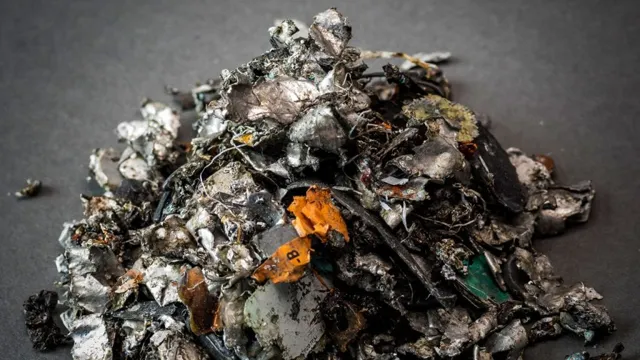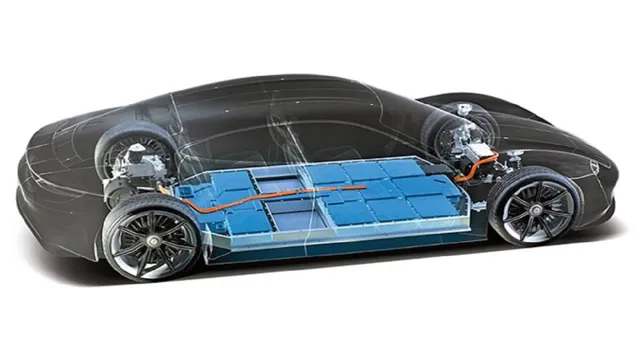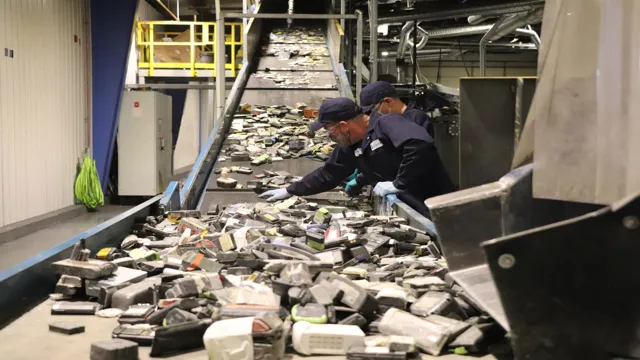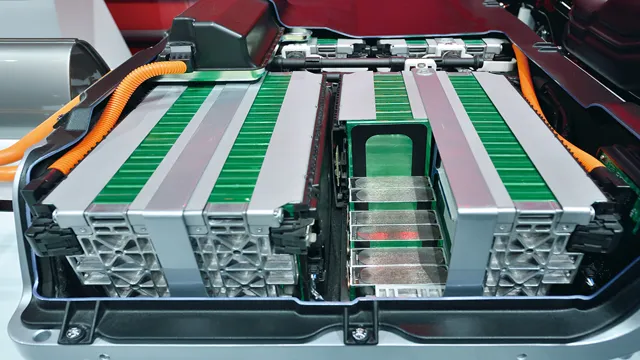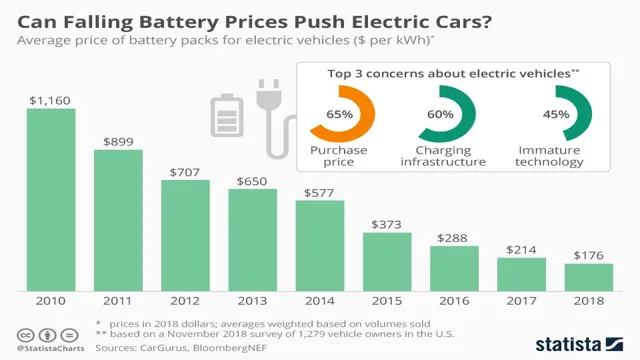Shocking Truth Revealed: The Harmful Impact of Electric Car Batteries on the Environment
Electric cars have long been touted as an eco-friendly transportation option, promising to minimize environmental impact and reduce carbon footprint. However, the electric car battery has remained a point of contention, raising concerns over its potential environmental impact. In recent years, electric car batteries have become much more advanced, boasting a longer lifespan and improved overall performance.
But what about their impact on the environment? Are they truly as eco-friendly as they claim to be? In this blog post, we’ll delve into the impact of electric car batteries on the environment and explore the potential implications they may have for our planet.
Introduction
Electric car batteries have often been touted as a cleaner and more eco-friendly alternative to traditional gas-powered vehicles, but there’s a growing concern about the potential harm they could cause to the environment. Although electric car batteries do not produce emissions like gas-powered cars, their production and disposal processes have an environmental impact. The production process involves the mining of precious metals, such as lithium and cobalt, which are used to make the batteries.
This mining process can have significant environmental impacts, including deforestation, water pollution, and soil degradation. Additionally, disposing of electric car batteries can also pose an environmental threat, as they contain toxic chemicals that can leach into the soil and water. It’s important to note that as technology advances, the environmental impact of electric car batteries may be reduced through improved production and recycling processes.
However, for now, it’s crucial that we continue to examine and address the potential harm that electric car batteries can cause to the environment.
What are Electric Car Batteries?
Electric Car Batteries Electric car batteries are an essential component of electric vehicles (EVs), powering their motors and enabling them to run without fuel or emissions. These batteries are complex and sophisticated, consisting of multiple lithium-ion cells interlinked together to create a powerful and efficient source of energy. One of the main advantages of electric car batteries is their ability to recharge, allowing drivers to travel long distances on a single charge while also reducing their carbon footprint.
However, the size and weight of these batteries can also be a challenge, as they require a significant amount of space and can add considerable weight to the car. Despite these challenges, electric car batteries have revolutionized the automotive industry, offering a clean, efficient, and sustainable alternative to traditional gasoline-powered vehicles.

Why are Electric Cars Considered Environmentally Friendly?
Electric cars have become increasingly popular in recent years, largely due to their reputation as environmentally friendly vehicles. But what exactly makes them environmentally friendly? Unlike traditional gasoline-powered cars, electric cars produce zero direct emissions from their tailpipes. Additionally, the electric power used to charge their batteries can come from renewable sources, such as wind or solar energy, further reducing their impact on the environment.
With their growing popularity, electric cars are helping to reduce air pollution, reduce greenhouse gas emissions, and combat climate change. As such, they are an important tool in the fight for a cleaner and more sustainable future.
Positive Environmental Impact of Electric Car Batteries
Contrary to popular belief, electric car batteries do not pose a significant harm to the environment. In fact, they have a positive environmental impact! One major advantage of electric car batteries is that they do not produce harmful emissions like gasoline-powered cars do. This means that they do not contribute to air pollution, which often results in serious health problems.
Additionally, electric car batteries are much more energy-efficient than traditional car batteries. They require less electricity to charge and can also be charged using renewable energy sources such as solar power. This helps to reduce our dependence on non-renewable fossil fuels and lowers our carbon footprint.
Furthermore, when electric car batteries reach the end of their life, they can be recycled, reducing waste and promoting a circular economy. Therefore, while critics may point to the initial production of electric car batteries, when considering their lifetime use and disposal, they prove to be a clear winner in their positive impact on the environment.
Reduction of Greenhouse Gas Emissions
The reduction of greenhouse gas emissions is an ongoing concern for many people around the world, and electric car batteries are one solution that has a positive impact on the environment. These batteries are designed to store energy and power electric vehicles, reducing the need for traditional gasoline-powered cars. With electric cars on the rise, fewer fossil fuels are burned, which means fewer emissions are released into the atmosphere.
This is because electric cars generate zero tailpipe emissions and use renewable energy sources like wind, solar, and hydroelectric power. What’s more, the lifecycle of electric car batteries is longer than ever, meaning they do not need to be replaced as often, and this reduces the amount of waste that ends up in landfills. All in all, electric car batteries are one of the most positive environmental innovations that could dramatically reduce greenhouse gas emissions in the years to come.
Increased Use of Renewable Energy Sources
Increased use of renewable energy sources is a positive step towards a greener future. Electric car batteries play a significant role in achieving sustainable transportation and reducing carbon emissions. Lithium-ion batteries, which are commonly used in electric cars, are rechargeable and can store large amounts of energy.
By using electric cars, we reduce our dependence on fossil fuels, which are finite resources and contribute to air and water pollution. Moreover, electric cars can serve as a means of energy storage for the grid, enabling more reliable integration of renewable energy sources such as solar and wind. This can lead to a more stable, efficient, and cost-effective energy system.
As we move towards a more sustainable future, the increased use of electric vehicles and renewable energy sources is vital in combating climate change and preserving the planet for future generations.
Negative Environmental Impact of Electric Car Batteries
Electric car batteries have been gaining popularity due to being environmentally friendly. However, the production and disposal of these batteries can have negative effects on the environment. Most electric vehicle (EV) batteries are made of lithium-ion, which creates a significant environmental impact because lithium is a rare metal that is mined from the earth.
Mining not only causes habitat destruction and soil erosion, but it also consumes vast amounts of water, which can lead to water scarcity. Additionally, the production and transportation of EV batteries can increase greenhouse gas emissions. When these batteries reach the end of their useful life, they need to be disposed of, which can also harm the environment.
While some batteries can be recycled, others end up in landfills, where they can leak toxic chemicals into the soil and water. Knowing this, manufacturers are exploring alternative materials to minimize the harm to the environment during production and disposal.
Battery Production and Disposal
Battery production and disposal can have a negative impact on the environment. One of the biggest environmental concerns with electric vehicles is the disposal of their batteries when they reach the end of their lifespan. Batteries used in electric vehicles contain rare and precious metals that require mining, which can be harmful to the environment.
Additionally, the production of these batteries requires a significant amount of energy, which leads to increased greenhouse gas emissions. However, it’s important to note that recycling programs have been put in place to mitigate the negative effects of battery disposal. Some companies are also working to develop sustainable materials for battery production, which could reduce environmental harm.
Overall, while the environmental impact of electric vehicle batteries is a concern, it’s important to recognize that efforts are being made to minimize their negative impact.
Mining and Extraction of Materials
Electric car batteries have offered a low-carbon alternative to traditional fossil fuel-powered vehicles. However, the negative environmental impact of their production cannot be underestimated. The mining and extraction of materials such as cobalt, nickel, and lithium, which are critical components in these batteries, have dire consequences on ecosystems and local communities.
The production of these materials often involves the removal of forests, massive water consumption, and toxic waste disposal. The environmental damage is severe, and this is a double whammy, whereby green technologies are causing ecological degradation. We must encourage electric car manufacturers to invest in less harmful mining practices and to search for alternatives to these damaging components.
The use of greener and innovative techniques can help reduce the environmental impact of electric car batteries while still maintaining their role in the transition towards a cleaner, low-carbon future. It is our collective responsibility to ensure that the benefits of electric cars do not come at the cost of the environment, and we can all do our part by advocating for sustainable and ethical practices.
Conclusion
In short, electric car batteries may not be as environmentally friendly as we’d hoped. While they don’t produce harmful tailpipe emissions, their manufacturing and eventual disposal can have negative impacts on the planet. However, this doesn’t mean we should give up on electric cars altogether.
With continued research and development, we can find ways to make electric car batteries more sustainable and less harmful to the environment. After all, progress is all about taking steps forward, even if they are baby steps.”
Overall Impact on Environment
Electric car batteries are often seen as a more environmentally-friendly option for transportation. However, there is a negative impact on the environment that is often overlooked. The production processes of these batteries require significant amounts of energy and materials, including lithium, cobalt, and nickel.
These materials are not sustainable and mining for them can cause significant damage to the local environment, including deforestation and pollution. Additionally, once the batteries are no longer useable, they must be disposed of or recycled properly to prevent further damage to the environment. Proper disposal and recycling can be costly and difficult to enforce, leading to potential pollution and environmental damage.
Therefore, while electric car batteries may have a lower carbon footprint during use, their overall environmental impact needs to be considered.
Future Developments in Battery Technology
As the popularity of electric vehicles (EVs) continues to grow, so does the demand for new and improved battery technology that can offer longer ranges and faster charging times. However, the negative environmental impact of EV batteries remains a concern. While electric cars emit zero emissions while being driven, the production of their batteries involves the extraction of rare and valuable metals, which can have significant environmental consequences.
Additionally, the disposal of these batteries once they reach the end of their lifespan can be hazardous to the environment. Fortunately, efforts are being made to develop sustainable and eco-friendly battery technology. Scientists are exploring new materials that can be used to create more efficient batteries, while also ensuring that they can be recycled and disposed of safely.
These developments can help minimize the negative impact of EV batteries on the environment and make them a more sustainable choice for transportation.
FAQs
How do electric car batteries harm the environment?
Electric car batteries contain materials such as lithium, cobalt, and nickel, which require energy-intensive mining processes that can harm the environment.
Can electric car batteries be recycled?
Yes, electric car batteries can be recycled, and the materials can be reused in new batteries or other applications.
What are the alternatives to traditional electric car batteries?
There are alternatives such as solid-state batteries that do not contain liquid electrolytes, which can be more environmentally friendly.
How can electric car owners dispose of old batteries safely?
Electric car owners should take their old batteries to a certified recycling center to ensure proper disposal and prevent harm to the environment.
